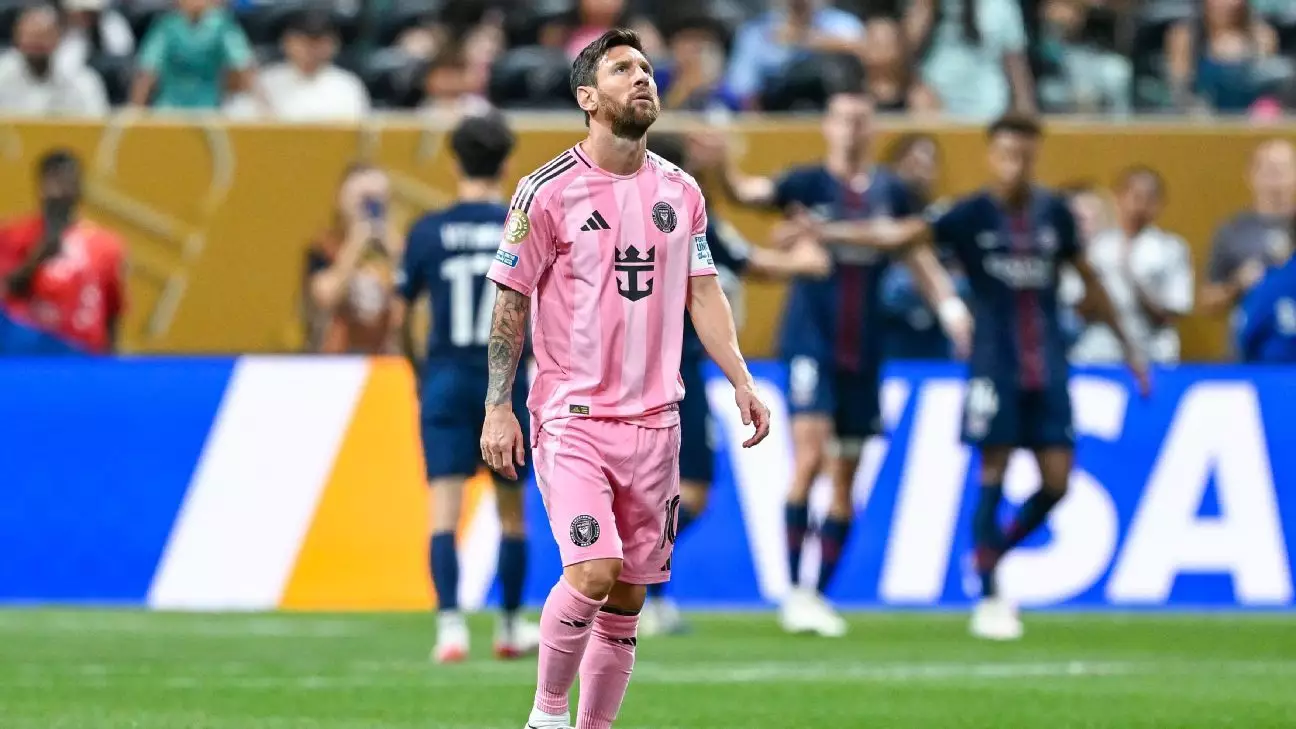The clash between Paris Saint-Germain (PSG) and Inter Miami CF in the FIFA Club World Cup spotlighted once again the stark contrast between Europe’s elite football powerhouses and rapidly developing MLS franchises. PSG’s comprehensive 4-0 victory over Miami was not just a scoreline; it symbolized the current gulf in quality, depth, and tactical maturity between the two football worlds. Under the guidance of Luis Enrique, PSG displayed a clinical and elegant brand of football, weaving through Miami’s defense with precision passes and relentless pressure. While the final result was a predictable outcome for many observers, the nuances in Miami’s performance reveal a complex story of growth, limitations, and potential.
The Inevitability of Experience and Depth
PSG’s attacking dominance was relentless from the start, forcing Inter Miami’s goalkeeper Oscar Ustari into early saves and scoring the first goal within eight minutes through a well-executed free kick. The efficient offensive movement that led to four goals was a masterclass in high-level football. However, the narrative extends beyond just PSG’s superiority; it exposes the challenge faced by clubs from MLS when competing on such a stage. Inter Miami’s reliance on marquee players like Lionel Messi, Luis Suárez, Jordi Alba, and Sergio Busquets underscores the league’s structural challenge: a few stars supported by a relatively thin squad depth, unable to withstand the rigors of intense international competition.
MLS Roster Restrictions: A Lingering Obstacle
This disparity is partly rooted in the restrictive MLS roster rules and designated player system, which limit roster flexibility and depth-building. Former coach Gerardo “Tata” Martino emphasized how this structure hinders competitiveness on international platforms, and his successor Javier Mascherano echoed those concerns. Miami’s lack of transfer activity ahead of the tournament was symptomatic of this system, leaving the team ill-equipped to cope with injuries and fatigue. The substitution struggles in the match against PSG, such as the early injury to Noah Allen and the consequential own goal by his replacement, Tomás Avilés, highlight how a limited bench can turn competitive matches into uphill battles.
Learning Through Adversity: Miami’s Growing Pains
Despite the harsh loss, Inter Miami’s journey in the Club World Cup has been remarkable on multiple fronts. The club, barely six years old, not only qualified by winning the Supporters’ Shield but also managed to navigate through the group stages with competitive results, including a victory over European competitors like Porto. Miami was the only MLS team to advance past the group stage, signaling progress beyond mere participation. Crucially, the experience gained by younger academy graduates such as Benjamin Cremaschi, Noah Allen, and Ian Fray—players untested on the global stage prior to this tournament—cannot be understated. Facing champions of the UEFA Champions League and Copa Libertadores provided a baptism by fire, accelerating their development and understanding of world-class football intensity.
Messi’s Magic: Inspirational but Insufficient
Lionel Messi’s brilliance shone through, reminding fans of why he is considered one of the greatest. However, his individual gifts, including moments of genius such as the goal against Porto, highlight a broader truth: one player, regardless of talent, cannot carry a team facing such elite opposition indefinitely. This reality has long been a debate surrounding MLS’s ambitions. While star signings are critical for visibility and immediate competitiveness, sustainable growth demands a robust roster with depth that complements these stars. Miami’s challenge in this respect was glaring against PSG, where the drop-off from their stars to the next tier of players was decisive.
The Harsh Spotlight of Global Football
PSG’s Jordi Alba—speaking post-match—underscored the elite discipline and physical demands instilled by coach Luis Enrique. Their dedication to intense work rate and tactical adherence differentiates champion European teams from their opponents. Alba’s insight serves as a reminder to MLS clubs about the level of preparation and commitment required to compete globally. This discipline extends to the tactical and physical attributes of the squad, which MLS teams must aspire to emulate if they hope to close the gulf.
The Path Forward for Inter Miami and MLS
Although the four-goal defeat was undoubtedly difficult, it is essential to frame Inter Miami’s performance within a broader context of rapid growth and ambition. The team’s competitive spirit, moments of quality play, and resilience in tough moments suggest that MLS clubs are making important strides towards competing internationally. However, for this progress to be sustainable, MLS must revisit and reform its roster rules to allow deeper, more balanced squads capable of withstanding intense competition.
Miami’s World Cup campaign will serve as a foundational experience for the club and its young players. The global exposure, the tactical lessons learned, and the benchmarks for improvement will influence how the club approaches future tournaments and domestic competitions. Inter Miami now has a clearer understanding of what it takes—and the sacrifices necessary—to challenge Europe’s soccer titans. The luxury of marquee signings alongside adequately developed squads and flexible roster structures will define the trajectory not only for Miami but for MLS’s aspirations on the international stage.

Leave a Reply